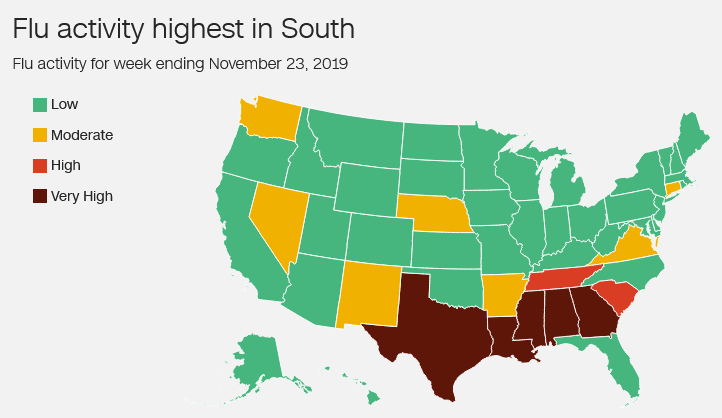Pills for pigs, the flu warning, dyeing for hair, and more
05 Dec 2019
Posted by Andrew Kantor
Pills for pigs, the flu warning, dyeing for hair, and more
“Free” HIV drugs, courtesy of HHS
The federal government will begin offering free HIV-prevention drugs to anyone without insurance, thanks to a deal it made with Gilead (the drug maker) as well as with CVS, Rite Aid, and Walgreens (which have agreed to dispense the drugs free).
Caveats: Patients are responsible for obtaining a prescription for the PrEP (pre-exposure prophylaxis) drugs and for getting an HIV test, which can cost up to $1,000 per year — remember, these are people without insurance.
But if the test is negative, patients can call (855) 447-8410 or visit getyourprep.com to apply for the free drugs.
Gilead is charging the government $200 per bottle, which is claims is the cost of transporting it from factories to pharmacies. That price may drop after March 30, by which time the government hopes to find a less expensive distributor.
Why not to dye
Apparently some permanent dyes and hair straighteners can increase a woman’s* chance of getting breast cancer. Regular use for a year meant an average 9% higher risk — on average. For African-American women, that risk was much higher:
Among African American women, using permanent dyes every five to eight weeks or more was associated with a 60% increased risk of breast cancer as compared with an 8% increased risk for white women.
Good news: “The research team found little to no increase in breast cancer risk for semi-permanent or temporary dye use.”
Pig contraception
Great news if you don’t want your pig to get pregnant: Scientists have tested the first monthly contraceptive pill on pigs. What’s cool: It’s designed to implant itself in the digestive tract and slowly release its medication over weeks.
Testing, 1, 2, 3
First: Researchers at Cambridge University, UC San Francisco, and biotech company SomaLogic, have developed a blood test they believe can predict a patient’s likelihood of developing a range of diseases.
No, this is not a repeat of the Theranos debacle — this technique uses real science and has published results. Because certain DNA fragments (aptamers) can only bind to certain proteins, the researchers look to see what aptamers are present.
That info is then fed into machine learning algorithms and used to predict things like the patient’s risk of developing diabetes or cardiovascular disease.
It’s still proof-of-concept, and it’s meant to assist physicians in health screenings — not to be
And: Scientists at the University of East Anglia in the U.K. believe they have a simple urine test to detect prostate cancer.
“Because the [Prostate Urine Risk] test accurately predicts aggressive prostate cancer, and predicts whether patients will require treatment up to five years earlier than standard clinical methods – it means that a negative test could enable men to only be retested every two to three years, relieving stress to the patient and reducing hospital workload.”
This headline shows why your patients need to worry about the flu
“One hospital had 9 flu cases at this time last year. This year, it has more than 1,400”

Sadly, the message isn’t getting through
37 percent of Americans don’t plan on getting a flu shot.
Mom was wrong
Drinking milk, it seems, doesn’t help you live longer*.
“Total dairy intake was not associated with lower risk of total mortality,” lead study author Ming Ding of the Harvard School of Public Health in Boston and colleagues write in The BMJ.


